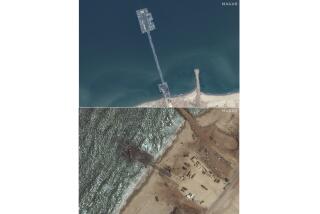Trucks Ferry Wheat to Iraq as Jordan Balks at Shutting Down Its Aqaba Port : Embargo: The U.S. has threatened a blockade if supplies get through. Bush and the king will face the question today.
- Share via
AQABA, Jordan — Heavy trucks roared north out of Aqaba carrying wheat for Iraq on Wednesday as Jordanian officials looked for a way to keep the port open.
Since the U.S. Navy began turning shipping away from Iraq’s ports on the Persian Gulf, this Jordanian port on an arm of the Red Sea has become the only one where cargo for Iraq can be landed.
On Wednesday, trucks were taking on wheat that had been unloaded into Aqaba’s silos, then heading north to Amman and on east to Iraq. “We’re on our way to Baghdad,” one driver told reporters.
At the Iraqi border, about 10 hours’ drive away, reporters saw scores of trucks loaded with wheat. One of the drivers lined up there told a reporter that wheat supplies were getting low at Aqaba, even though Jordan has refused to go along with the United Nations-sanctioned embargo on trade with Iraq.
The U.S. government has threatened to blockade Aqaba if it appears that the port is being used to supply Iraq. A U.S. naval force led by the aircraft carrier Eisenhower has been ordered to the Red Sea.
King Hussein of Jordan is scheduled to meet with President Bush today, and the question of Aqaba is expected to be raised.
Jordanian officials were still equivocal Wednesday on the subject of applying the sanctions. The only thing that seemed clear is that Jordan, which depends heavily on Iraq for oil and other trade, is searching for a way out.
“Jordan is feeling the pinch,” Crown Prince Hassan, King Hussein’s brother, told the press.
Jordanian officials put forth several proposals calculated to avoid taking part in the sanctions. For one thing, they said, Jordan should have a 30-day grace period. And they said they are considering asking the United Nations for an exemption because their economy is tightly entwined with Iraq’s.
The officials said Jordan finds itself in a situation like that of the countries that border on South Africa, which have quietly continued to trade with South Africa, with tacit U.N. approval, despite the sanctions imposed on that country.
For a second day in a row, Prince Hassan hinted that Jordan will need foreign aid to make up for any reduction in trade with Iraq. Jordan receives most of its oil from Iraq and sends much of its exports to Iraq.
It is not at all clear that President Bush, who has moved quickly to tighten the sanctions, will be patient with Jordan if it hesitates much longer. Bush has commented favorably, however, on the question of compensation.
There was evident tension at Aqaba, where Jordanian officials confirmed that two ships had refused to unload cargo in recent days. But they said the problem had to do with payments from Iraqi buyers, not politics.
Freight forwarders said the port authorities forced the ship captains to unload grain.
In one case, Jordanian officials “intervened” to persuade a Norwegian captain to unload wheat, the freight forwarders said. In another case, an anchored Greek freighter carrying wheat and sugar suddenly cut communications with the port. When officials went to investigate, they found that the ship’s radio had been sabotaged.
The ship was then towed to a pier, but the captain still refused to unload until the owner of the vessel arrived. Even then only a fraction of the cargo was taken off, officials said.
Reporters have not been permitted to visit ships docked at the port.
Officials at the port said they are confused about their government’s position. Port Director Awad Tell said that ships may still come in, but Bassam Kakish, who as regional development director is the king’s direct representative, said the U.N. sanctions are being applied.
However, Tell and Kakish both said that no ship of any nationality had arrived in port for two days.
Freight forwarders said three ships arrived but had anchored and refused to come in and unload their cargoes. In all, there were eight freighters docked and four others anchored out.
Traffic at the port is down. Port Director Tell recalled that in the early years of Iraq’s war with Iran, there were times when as many as 100 ships were lined up here with cargo for Iraq. Iraq’s ports on the Persian Gulf were blocked by wreckage then and under constant threat of bombardment by Iran.
According to Kakish, the development director, the number of ships calling at Aqaba in recent years has averaged about 25 a day. The port employs 2,500 full-time workers and several hundred part-time workers. It has berths for 20 ships.
Aqaba’s townsfolk appear to be aware of the precarious situation at the port and alarmed at the economic implications.
“There will be no money here,” Daniel Hagop, a clerk in a photography studio, said Wednesday.
Naim abu Mafhouz, a rug merchant, said, “We will eat dates and water to survive.”
Tourists on the beach were calling home to advise friends and relatives that they were safe.
“But they will start to leave soon,” predicted Mohammed Zghoul, an assistant manager at a large beachfront hotel.
More to Read
Sign up for Essential California
The most important California stories and recommendations in your inbox every morning.
You may occasionally receive promotional content from the Los Angeles Times.













